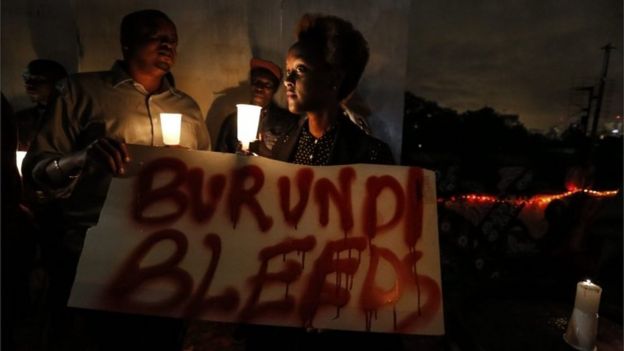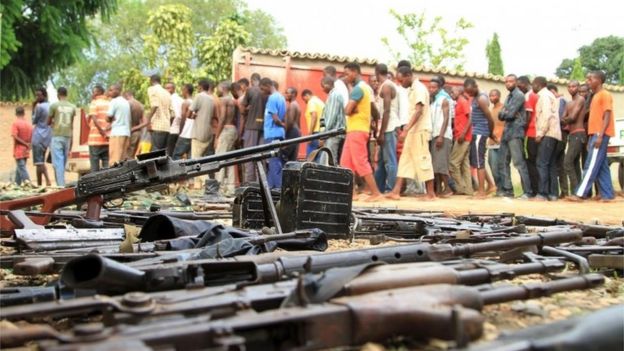The proposal was approved by the AU's Peace and Security Council but will need to get the backing of the UN.
On Thursday the AU said it would not allow genocide to take place in Burundi.
But Burundi said if the AU sent troops with the government's consent it would consider the move "an attack" on it.
Government official Philippe Nzobonariba told the BBC Great Lakes service that the legal process should be followed, and suggested that a peacekeeping force would be better employed in Rwanda.
Burundi has previously accused its neighbour of training rebels seeking to destabilise the country.
 Image copyrightEPAImage captionBurundians living in Kenya have held vigils to raise awareness about the conflict
Image copyrightEPAImage captionBurundians living in Kenya have held vigils to raise awareness about the conflictUnrest in Burundi began in April when President Pierre Nkurunziza announced he would seek a third term in office. He survived a coup attempt in May, and secured a third term in disputed elections in July.
The proposal by the AU marks the first time it has invoked a rule allowing it to deploy a force without a country's consent, the BBC's Anne Soy reports from Nairobi.
The clause in the AU charter allows it to intervene in a member state because of grave circumstances, which include war crimes, genocide and crimes against humanity.
The decision comes amid fears that violence could spiral into civil war and possible ethnic conflict.
Diplomatic moves to prevent a civil war in Burundi have recently accelerated with the UN, the European Union and the East African Community fearful of the impact of worsening violence both on the local population and the region.
At a special session convened at the US' request to discuss the conflict, the UN Human Rights Council resolved to despatch independent investigators to Burundi to probe abuses.
The government has said there is no threat of genocide.
 Image copyrightReutersImage captionBurundi's security forces have displayed weapons that they have seized from civilians
Image copyrightReutersImage captionBurundi's security forces have displayed weapons that they have seized from civiliansUN High Commissioner for Human Rights Zeid Ra'ad al-Hussein said on Thursday that "Burundi is at bursting point, on the very cusp of a civil war" which could have "ethnic overtones" similar to past conflicts in Burundi.
At least 400 people have been killed, nearly 3,500 arrested and at least 220,000 people have fled the country since April, Mr Hussein said.
The worst spate of killings happened last Friday when 87 people were killed in clashes in the capital, Bujumbura.
An AU fact-finding mission returned from Burundi on Sunday and in its preliminary findings it said "members of the team heard reports of arbitrary killings, torture and the arbitrary... closure of some civil society organisations and the media".
Ethnic conflict between Hutus and Tutsis in the 1990s claimed an estimated 300,000 lives.
Mr Nkurunziza is the former leader of a Hutu rebel group, who has been in power since a 2005 peace deal.
Both the government and the opposition are ethnically mixed.
Timeline - Burundi crisis
April 2015 - Protests erupt after President Pierre Nkurunziza announces he will seek a third term in office.
May 2015 - Constitutional court rules in favour of Mr Nkurunziza, amid reports of judges being intimidated. Tens of thousands flee violence amid protests.
May 2015 - Army officers launch a coup attempt, which fails.
July 2015 - Elections are held, with Mr Nkurunziza re-elected. The polls are disputed, with opposition leader Agathon Rwasa describing them as "a joke".
November 2015 - Burundi government gives those opposing President Nkurunziza's third term five days to surrender their weapons ahead of a promised crackdown.
November 2015 - UN warns it is less equipped to deal with violence in Burundi than it was for the Rwandan genocide.
December 2015 - 87 people killed on one day as soldiers respond to an attack on military sites in Bujumbura
-BBC


No comments:
Post a Comment